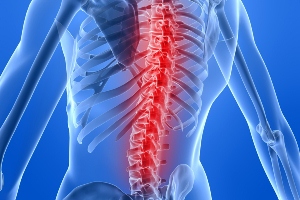
Why Does Back Pain Tend to Recur?
In a recent Consumer Reports survey, 88% of more than 14,000 subscribers who had lower back pain indicated that it had recurred during the prior 12 months. While other academic studies suggest that recurrence may be somewhat less widespread—perhaps affecting between a third and half of all back pain sufferers—it’s very clear that many people experience back pain as a recurring problem.
Professor Doune Macdonald and fellow researchers at the University of Queensland in Brisbane were interested in learning why some people experienced a recurrence of their back pain while others did not. Their investigation found an association between recurrence of low back pain and altered muscle activity in the deep muscle fibers of the lumbar spine. These muscles are also referred to as your “core” muscles, the ones that are most targeted in Pilates training. Your core muscles give strength, balance and stability to the back, and consist of muscles in the lower back, abdomen and pelvis.
The most important of the core muscles for the stability of your back are the multifidus. These run along the length of the spine and help to take some of the pressure off the vertebral discs so that weight is more evenly distributed along the length of the back. When working properly, the multifidus muscles are activated even before any movement takes place, so as to protect the spine against injury from a sudden load of weight (such as when lifting a heavy box or bending over to tie your shoes).
According to a study published in the journal Painin 2009, Macdonald and colleagues found that the multifidus muscles showed later activation in those with recurrent low back pain than in the backs of healthy subjects. Any delay in muscle activation can be a potential problem, as a sudden loading of weight on the spine when it is unprepared can lead to abnormal bending and twisting of the spine, increasing the risk of injury.
Possessing strong multifidus muscles is one of the obvious solutions to preventing the occurrence of low back pain. However, part of the problem is that once this set of muscles has been injured, the multifidus tends to atrophy due to disuse while the patient is healing. Prolonged bed rest is one of the worst ways to recover from low back pain because it encourages the multifidus to atrophy even further.
Chiropractic care that includes rehabilitation exercises and spinal adjustments has been shown to improve the function of the multifidus muscles. Your chiropractor can suggest exercises you can do at home that will strengthen your core muscles in between adjustments. The adjustments themselves will align your spine so that it functions properly and will not put excess strain on the supporting multifidus, thus reducing the likelihood of a recurrence of low back pain.